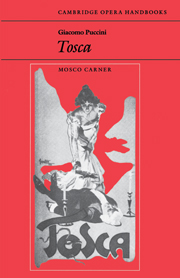Book contents
- Frontmatter
- General preface
- Contents
- List of illustrations
- 1 Sardou and his La Tosca
- 2 Naturalism in opera: verismo
- 3 Genesis of Tosca
- 4 Synopsis
- 5 Play and opera: a comparison
- 6 First production and critical history
- 7 Interpretation: some reflections
- 8 Style and technique
- 9 Musical and dramatic structure
- 10 Analysis: Act I in perspective
- 11 Tosca in the United States
- Notes
- Select bibliography
- Discography by Malcolm Walker
- Index
10 - Analysis: Act I in perspective
Published online by Cambridge University Press: 04 August 2010
- Frontmatter
- General preface
- Contents
- List of illustrations
- 1 Sardou and his La Tosca
- 2 Naturalism in opera: verismo
- 3 Genesis of Tosca
- 4 Synopsis
- 5 Play and opera: a comparison
- 6 First production and critical history
- 7 Interpretation: some reflections
- 8 Style and technique
- 9 Musical and dramatic structure
- 10 Analysis: Act I in perspective
- 11 Tosca in the United States
- Notes
- Select bibliography
- Discography by Malcolm Walker
- Index
Summary
It is perhaps because of our over-familiarity with Puccini's musical language – and of course its exploitation in the hands of numerous imitators, both in Hollywood and elsewhere – that critical writings on the composer have tended to polarize. On the one hand, there are those who seem to resent profoundly his popular success, who find his music coarse, vulgar and cynical, and who present his image as a blunt stone on which to sharpen their wit. This started almost from the beginning. La Bohème and Tosca, for example, were initially greeted coolly by the press: both represented a change of direction which the critics found hard to follow. And the eventual canonization of these operas, far from redeeming Puccini in the eyes of the journalists, simply added more fuel to their fire: as his later operas appeared, they were constantly arraigned for falling below the standard of the early works, now proclaimed ‘masterpieces’. A little later, the Italian critic Fausto Torrefranca devoted a full-length book to the composer. It turns out to be a polemic of rare severity: a study whose approach to its subject is almost entirely negative. As Torrefranca says in his Preface, he chose Puccini because: ‘he seems to me the composer who personifies with greatest completeness the decadence of today's Italian music, and who represents its cynical commercialism, its lamentable impotence, its celebration of the international vogue’.
- Type
- Chapter
- Information
- Giacomo Puccini: Tosca , pp. 117 - 142Publisher: Cambridge University PressPrint publication year: 1985



